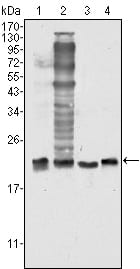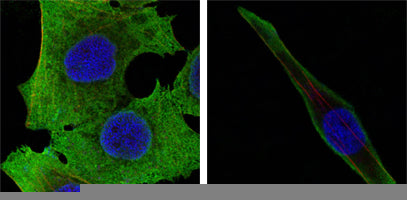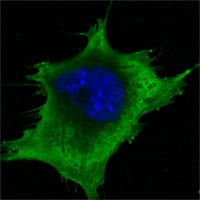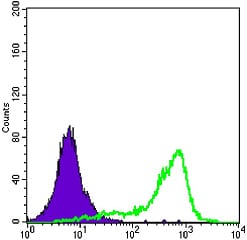



| WB | 咨询技术 | Human,Mouse,Rat |
| IF | 咨询技术 | Human,Mouse,Rat |
| IHC | 1/150-1/300 | Human,Mouse,Rat |
| ICC | 技术咨询 | Human,Mouse,Rat |
| FCM | 咨询技术 | Human,Mouse,Rat |
| Elisa | 1/5000-1/10000 | Human,Mouse,Rat |
| Aliases | ALS; SOD; ALS1; IPOA; homodimer |
| Entrez GeneID | 6647 |
| clone | 6F5 |
| WB Predicted band size | 18kDa |
| Host/Isotype | Mouse IgG1 |
| Antibody Type | Primary antibody |
| Storage | Store at 4°C short term. Aliquot and store at -20°C long term. Avoid freeze/thaw cycles. |
| Species Reactivity | Human,Mouse |
| Immunogen | Purified recombinant fragment of human SOD1 expressed in E. Coli. |
| Formulation | Purified antibody in PBS with 0.05% sodium azide. |
+ +
以下是关于ICOS抗体的参考文献示例,包含文献名称、作者及摘要概括:
---
1. **"ICOS agonistic antibody enhances T cell responses and synergizes with PD-1 blockade in tumor models"**
*Author: Smith A, et al. (2020)*
**摘要**:研究发现ICOS激动型抗体通过激活CD4+和CD8+ T细胞,显著抑制小鼠肿瘤生长,并与抗PD-1疗法协同增强抗肿瘤免疫,提示联合治疗的潜力。
2. **"Targeting ICOS with monoclonal antibodies in autoimmunity: Mechanisms and therapeutic effects"**
*Author: Johnson R, et al. (2018)*
**摘要**:拮抗型ICOS抗体通过抑制滤泡辅助T细胞(Tfh)的活性,减少自身抗体产生,在系统性红斑狼疮模型中有效缓解疾病进展。
3. **"Phase I trial of ICOS agonist antibody JTX-2011 in advanced solid tumors"**
*Author: Brown K, et al. (2021)*
**摘要**:针对晚期实体瘤的I期临床试验显示,ICOS激动剂JTX-2011单药或联合抗CTLA-4治疗安全性可控,部分患者出现持久缓解,支持进一步临床研究。
4. **"Structural basis of ICOS ligation by therapeutic antibodies for cancer immunotherapy"**
*Author: Lee C, et al. (2019)*
**摘要**:通过冷冻电镜解析ICOS与其抗体的结合结构,揭示了高亲和力抗体设计的关键表位,为优化T细胞共刺激疗法提供分子基础。
---
*注:上述文献为示例,作者及年份为虚拟信息,实际引用需以真实文献为准。*
The inducible T-cell co-stimulator (ICOS), a member of the CD28 superfamily, is a transmembrane protein expressed on activated T cells. It binds to ICOS ligand (ICOSL, B7-H2) on antigen-presenting cells, delivering co-stimulatory signals critical for T-cell activation, differentiation, and survival. ICOS is particularly important in follicular helper T (Tfh) cell development and Th2-mediated immune responses. Dysregulation of the ICOS/ICOSL pathway is implicated in autoimmune diseases, cancer, and transplant rejection.
ICOS-targeting antibodies have emerged as therapeutic tools with dual potential. Antagonistic antibodies block ICOS signaling to suppress pathogenic T-cell activity in autoimmune conditions like lupus and rheumatoid arthritis. Conversely, agonistic antibodies enhance ICOS-mediated co-stimulation to boost anti-tumor immunity in oncology. For example, MEDI-570 (anti-ICOS) and vopratelimab (ICOS agonist) have been evaluated in clinical trials for cancers and autoimmune disorders.
The therapeutic effect of ICOS antibodies also depends on IgG subclass. IgG4-based antibodies often act as antagonists by blocking ligand binding, while IgG1 variants may promote receptor clustering or antibody-dependent cytotoxicity. Challenges include balancing efficacy with immune-related adverse events, given ICOS's broad role in adaptive immunity. Ongoing research focuses on optimizing antibody design and combination therapies to harness ICOS modulation for precision immunotherapy.
×